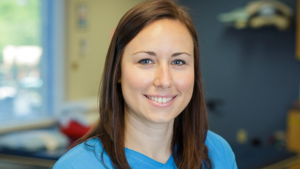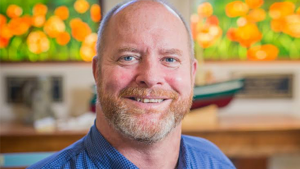Brooks Expertise Helps to Overcome Unknowns

Back to physical health resource hub
This year is shaping up to be an exciting one at Brooks Rehabilitation. A plethora of new and continuing programs and projects promise to benefit patients, employees and business operations.
Of course, one of the biggest unknowns looming on the horizon is the possibility of repealing the Affordable Care Act (ACA). CEO Doug Baer is confident that Brooks will meet any coming challenges. “When more people have insurance it is better for our patients and ultimately, this also benefits Brooks. However, financial pressures associated with serving the uninsured will not increase significantly with a repeal of the ACA. We’ve been dealing with rising deductibles and copays over the years like everybody else, and we’ve been adapting to that and working with our patients to find affordable solutions.”
President and COO Michael Spigel wholeheartedly agrees. “We cared for many, many people before the Affordable Care Act and that won’t change regardless of what happens. The worst case would be if we have more need for charity and free care than we already offer to people who are underinsured and uninsured but we’ve always been able to accommodate our patients and that will not change.”
A Focus on Performance
One of the real concerns is the push to privatize Medicare, according to Spigel. “We know in the businesses that we’re in, Medicare Replacement Plans use services like ours to a lower degree than Medicare beneficiaries who are in the traditional Medicare Plan.” While privatization is at least five to ten years away, Value-Based Purchasing for skilled nursing and home care is set to begin in 2019. Payment will be directly tied to quality of service – a signal to providers that outcomes matter and performance impacts revenue and top providers will always be rewarded.
Brooks has been preparing for this shift for several years. We were an early adopter of the CMS Bundled Payment for Care Improvement (BPCI). We refer to this initiative as Complete Care. Through care redesign and improvements in the coordination of health services, we have been able to improve patient outcomes and decrease hospital readmissions while reducing costs by 20 percent.
Despite the external forces that might drastically reshape the health care industry, both Brooks leaders are optimistic about the future. Spigel describes Brooks as a high-quality, smart organization where uncertainty is an opportunity and advantage. “You have to remain nimble and agile while focusing on the future. And you have to be willing to take some risk to try new things out.”
An Empowered Staff
In 2017, many of those new things will come directly from our staff who are empowered to improve their skills and share their ideas through various initiatives. Some of these highlights include:
- Internal Career Development Residency: Non-managerial frontline employees selected for this three-month career development rotation will lead a significant project to develop new career-enhancing skills. According to Doug Baer, “We want to find ways to enable our employees to grow within the organization.”
- Center for Technology: This initiative started in 2016 and will continue through 2018. Over three years, Brooks is investing $250,000 annually to identify new and emerging patient care technologies. Employees can submit an application and if accepted, Brooks will purchase the technology then work with the manufacturer to test its effectiveness for improving patient outcomes.
- Institute of Higher Learning (IHL): Brooks offers a range of world-class educational opportunities that support personal, career and clinical development. The Brooks IHL expands the reach of our clinical and professional programs by offering Continuing Education, Clinical Student Internships, Residencies and Fellowship programs to the greater healthcare community.
“I think it’s one of the things that differentiates us from almost all healthcare providers in the country. We really believe in the concept of continuous learning and continuous education,” said Spigel.
- Crowdsourcing: During this event, employees (individuals and groups) are invited to submit ideas for new services, businesses or programs. The ten best ideas are then pitched to the management team. The winning person or team will receive $10,000 to further develop their idea. If the project proves to be a viable growth opportunity, Brooks will fund and implement the service, business or program. Both the Aphasia Center and Family Housing were first presented through the crowdsourcing process. Another crowdsourcing event will be held later this year.
A Future Built Around Patients
When asked what he was most looking forward to, Baer said, “What’s most exciting to me is our focus on patients, their families and being able to continue to elevate what we do.” It’s this type of forward-thinking vision that fostered business line growth in 2016 and will continue in 2017 to better support and improve patient experiences and outcomes:
- University Crossing: Though it opened in 2016, Brooks’ new skilled nursing facility will expand its admissions in 2017. Ultimately, the facility will employ 200 new staff to serve the needs of 1,200 short and long-term rehabilitation patients per year.
- Family Housing: Our 40-unit apartment/hotel will open directly across the street from Brooks Rehabilitation Hospital and University Crossing as a place for out-of-town family members to stay while their loved ones receive care.
Brooks is confident the company will remain strong and well-positioned in 2017 due to exceptional personnel and high-quality patient care. “We provide critically important healthcare and community benefit services. We’re a pretty special company because of that. I believe that’s why doctors trust us with their patients and patients want to come to us for services. We strive to ensure each person has a great experience and has the best recovery possible. We are able to do that because of our dedicated employees, our technology and the educational opportunities we offer to enhance clinical skills,” said Baer.


